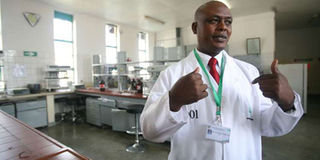Medical quality control lab hasn't received samples for testing for three years

National Quality Control Laboratory director Dr Hezekiah Chepkwony at Kenyatta National Hospital Laboratory on August 4, 2015 when journalists visited the facility to check on the progress of the ongoing polio vaccination. Dr Chepkwony lamented on February 17, 2016 that parastatals that regulate medical supplies and devices have not been sending samples for testing putting Kenyans lives at risk of infections. PHOTO | EVANS HABIL | NATION MEDIA GROUP
What you need to know:
- Machines for testing syringes, needles and surgical gloves have been lying idle at the National Quality Control Laboratory.
- A condom tester machine used to check quality has also not been used for three years now.
- The quality control director has not been receiving samples of products for testing from parastatals that regulate medical supplies and devices.
Patients and people seeking to avoid contracting HIV may be at risk of infections because the medical supplies they use have not been tested for quality for three years now.
A machine for testing quality of syringes, needles and surgical gloves among others has been lying idle at the National Quality Control Laboratory, the director Hezekiah Chepkwony said in Mombasa on Wednesday.
The same is the case with the condom tester machine — used to check quality of condoms, which many rely on to avoid contracting HIV through sex.
Dr Chepkwony spoke at an ongoing meeting in Mombasa for the heads of various parastatals in the Ministry of Health.
“Our machine for testing quality of condoms is underutilised yet the products are bought and are in use,” he said.
REFORMS NEEDED
He noted that the facility has not been receiving samples of products for testing from parastatals that regulate medical supplies and devices.
And even though the lab has capacity to test quality of medical products, its staff do not go out to collect samples but expect products to be taken to them for testing, he added.
“These samples are supposed to be brought to us through regulatory bodies. We should work hand in hand with Kenya Bureau of Standards as well as hospitals who use these devices ” he pointed out.
Earlier in his presentation, Dr Chepkwony said that the Kenya Medical Supplies Authority (Kemsa) and Pharmacists and Poisons Board (PPB) are some of key clients for the laboratory.
Health Principal Secretary Nicholas Muraguri said the ministry and regulatory boards are working on reforms to ensure de-registered medical practitioners do not practise elsewhere.
Dr Muraguri said the reforms follow discoveries that some de-registered medics have opened clinics or practising outside the country.
“ Some quack medical staff have been going within the East African region or other countries. Our new reforms will ensure they do not practise anywhere else,” said Dr Muraguri.
The PS said plans were underway for establishment of a new body to regulate use of cosmetics, supplements and other products that are in market yet pose dangers to the public.





